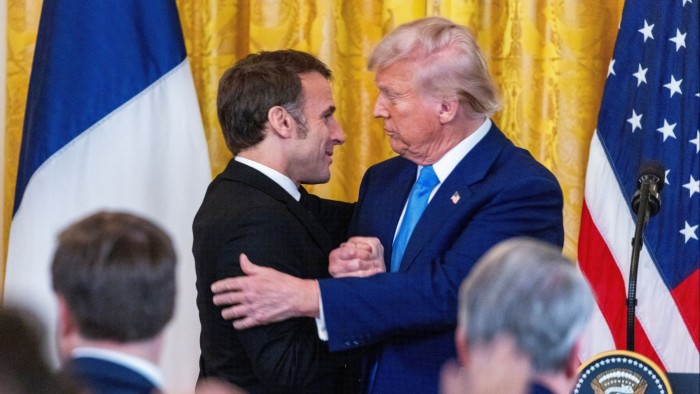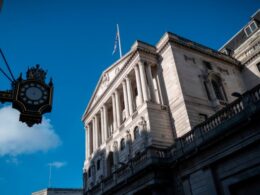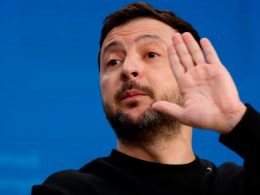Unlock the White House Watch newsletter for free
Your guide to what the 2024 US election means for Washington and the world
Emmanuel Macron hailed a “turning point” in efforts to sway Donald Trump on Ukraine but failed to secure a commitment from the US president to support any deployment of European troops to deter Russia in any postwar settlement, according to officials.
The French president, who visited the White House on Monday, will be followed in Washington on Thursday by UK Prime Minister Sir Keir Starmer, who will make a further push for concrete assurances from the US.
“There are Europeans that are ready to engage to provide for these security guarantees,” said Macron after his meeting with Trump. “Now there’s a clear American message that the US as an ally is ready to provide that solidarity for that approach. That is a turning point in my view.”
Starmer has been working with Macron and other European leaders on a proposal to present to Trump on Thursday, including the potential deployment of a “reassurance force” relying mostly on air power and backed by the US. The French and British leaders co-ordinated their messages in a phone call on Sunday, a French official said.
Paris, London and other European capitals have said they are willing to carry the bulk of the burden of postwar security in Ukraine. But given their limited capabilities, they have called for US logistics and intelligence support and ultimately its military protection for the mission to succeed — something both Macron and Starmer described as an American “backstop”.
Speaking during a press conference at the White House, Macron said Trump had agreed to play such a role.
Earlier in the day, when Trump was asked if European troops would have US support, he said: “We will have a backing of some kind. Obviously European countries are going to be involved.” But the US president quickly added he did not believe European countries would “need much backing” since he trusted Russia to stick to any agreement.
A French official said there was “no definitive agreement” on the nature of US back-up in Ukraine given the discussions were at a preliminary stage. But the official added: “There is no objection from President Trump to the Americans giving security guarantees.”
Trump, surprisingly, announced that President Vladimir Putin would accept the presence of European troops in Ukraine, although the Russian leader had not said so publicly. “I’ve specifically asked him that question, and he has no problem with it,” said Trump. The Kremlin on Tuesday denied any such concession.
The European leaders’ visits to the White House come amid heightened fears in Europe that Trump will rush into a ceasefire deal with Putin that favours Russia. On Monday, the three-year anniversary of the full-scale invasion of Ukraine, the US sided with Russia at the UN, refusing to describe Moscow as the aggressor.
The French official said much of the discussion between Trump and Macron had been about how to ensure Russia stuck by the terms of a ceasefire and avoid a repeat of 2015-16, when Moscow failed to comply with its obligations under the Minsk accords to stop the fighting in eastern Ukraine.
European capitals are also concerned that they and Ukraine’s President Volodymyr Zelenskyy are being left out of negotiations between Russia and the US on ending the war. Trump has described Zelenskyy as a “dictator” but not Putin.
Macron walked a fine line during his visit to the White House by studiously avoiding criticism of Trump, cracking jokes and treating the president to a farewell embrace.
But Macron also fact-checked Trump in front of reporters, rebutting Trump’s false claim that the US had provided far more aid to Ukraine than Europe, or that they were all loans.
“I think the visit was successful in that Macron’s strategy is not to upset Trump in an effort to sell him a comprehensive peace deal backed by the US,” said Michel Duclos, a former diplomat and expert at the Institut Montaigne in Paris. “He did make progress on that front even if Trump remained quite elusive.”
European diplomats in private were also largely appreciative of Macron’s performance, but some fretted that the French leader believed Trump was more amenable than was really the case.
“He played it well. Polite, amicable but also challenged the false narrative on Ukraine funding,” said one diplomat.
A second expressed concern that Macron “might now be more open to Trump’s ideas on Ukraine, thinking he will be able to steer [him]”.
Alar Karis, Estonia’s president, told the Financial Times, that on the idea of European troops “some countries are ready, some countries are not”. He added: “The transatlantic bond is important for Europe.”
Additional reporting by George Parker in London
Source link









